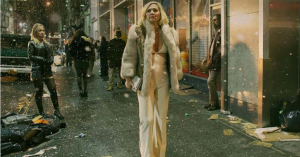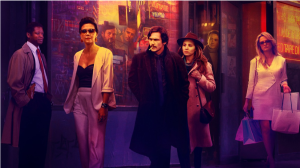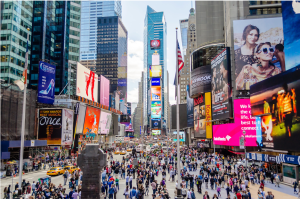The Deuce
As The Deuce on HBO is now at an end, we take the time to examine each season and why it was so darn good.
I have been writing this for two weeks, and tonight I watched the series finale of The Deuce. It was the last hour of a three-season, twenty-five episode examination of porn and prostitution in New York City, and I found my chest tightening, my eyes welling, and a rush of emotional sentiment. Maybe I was tired from work, maybe I was up too late past my bedtime (I watched this at, like, 10:30 PM), maybe it just made me take a goddamn good look at myself in the mirror. I have been thinking about The Deuce so much lately, the final minutes of the final episode actually came to me in a dream three nights before I saw the ending. I had been wondering ‘what would happen if…’ and I actually got my answer. The final message is alarming and accurate. But before I explain what I mean by that, let me set some ground rules to allow you to continue reading without discomfort.
- I will not spoil the show or details of the show for those of you who haven’t see it (yet).
- I will not disguise the fact that I absolutely loved all three seasons of the show and would add it to my list of perfect television.
- I will not recommend that you continue your interest in this show, or article, if you are uncomfortable with pornography, prostitution, pimps, ho’s, graffiti, cocaine, drugs, alcoholic policemen, corrupt politicians, AIDS, violence, murder and street litter. There is a lot of fucking in The Deuce. If you are not comfortable with these things, this is your stop.
I started watching The Deuce at season one because I liked the way it looked, physically and statistically. As a period piece I was attracted to the 1970s look of clothes, cars, hairstyles and furniture. As an HBO show I knew the attention to detail would be nearly bulletproof, and as a David Simon show (The Wire, Generation Kill, Treme) the story and dialogue would demand patience and focus but the character developments would richly reward the audience who payed close attention. In fact, The Deuce looks so authentic, 1971 seems reasonably recent enough in my own past that I could just reach back and touch it. But the fact is that those loose, rough days of superficially simpler times are so far gone that people only seem to remember what they want to remember. People forget about the crime, corruption and cops in Times Square because it’s gone now, and crime is like a toothache – you only think about a dentist when your tooth hurts.
With a distinct visual style comes the need for a soundtrack, and The Deuce delivers from the opening credits. Each season uses a slightly different opening credit sequence, and a different song. I would even argue that each season has its message, character behaviours, and story arc built around the lyrics of the opening sequence.
Season 1: (Don’t Worry) If There’s a Hell Below, We’re All Going to Go – Curtis Mayfield
Sisters, brothers and the whities
Blacks and the crackers
Police and their backers
They’re all political actors
The Deuce refers to an area of NYC along 42nd St W between 7th and 8th Ave. Set in 1971, season one is the story of street life — prostitutes, pimps, johns, bars and the mob – in an unrecognizable America. Craziness. Unfathomable filth and fury, an area where books smarts without street smarts will see you dead, or in jail – or worse. And yet, it is industry. A dangerous, not-first-choice-of-career type of employment, but a job that pays the bills. And everybody got caught up in it, like dirt in a vacuum. People with basically ideal lives (fair childhood, loving home, economic advantage) wonder how the people in The Deuce got where they are, but the reasons are subtle. Until they’re suddenly not. Enter Frankie and Vincent Martino (both played by James Franco), identical twin brothers who have very different ideas on how to live their lives in the neighbourhood.
Vincent is an honest and principled man, but one with a limit like anyone else. Exasperated by the relentlessness of his life, Vincent shouts uselessly into a phone, “Why do I got two jobs? Because I gotta work both sides of the river seven fuckin’ nights a week to make enough for me and my fuckin’ family”!
Enter Rudy Pipalo, mob capo. Soon, Vincent and Frankie are both answering to Rudy. Paying Rudy. The Deuce is a vampire, seducing and consuming its prey, drawing in the weak with the lure of stimulation while infecting them with a self-deprecating repulsion.
Along comes Candy (Maggie Gyllenhaal), a damaged but fiercely independent sex worker who stands united alone from all the other girls and their pimps. Before this show, I was very take it or leave it/don’t care about Maggie Gyllenhaal, but if you want to see a performance capable of actually dropping jaws to the floor, it’s right here. She is a fucking assassin. The amount of emotion she conveys and story she tells without even speaking a line was not lost on me. This performance by Maggie Gyllenhaal is amongst the best on television and likely to never be sufficiently recognized.
Enter prostitutes Ashley, Lori, Darlene and Melissa, pimps C.C. and Larry, our main access to the world of sex workers. We meet Abbey, the NYU student from wealth, Officer Chris Alston, gay activist Paul Hendrickson, city representative Gene Goldman and film school drop-out turned porn director, Harvey Wasserman. Along with Loretta, Bernice, Black Frankie and Big Mike, these are the brothers and the sisters. They are the blacks and the crackers, the police and their backers. They’re all political actors.
Season 2: This Year’s Girl – Elvis Costello
See her picture in a thousand places ’cause she’s this year’s girl
You think you all own little pieces of this year’s girl
Forget your fancy manners
Forget your English grammar
‘Cause you don’t really give a damn about this year’s girl
Still you’re hoping that she’s well-spoken ’cause she’s this year’s girl
You want her broken with her mouth wide open ’cause she’s this year’s girl
It’s 1977 and prostitution is moving from the streets to the parlours. New York City introduced the Loitering For Prostitution Law that year, forcing the sex workers indoors. Shortly after this, home video would become a ubiquitous medium and send a new message. In the world of The Duce, the message was you could jerk off to a film in your living room instead of a booth on 45th Street for quarters. Sex workers from the streets look towards more money in porn. Pimps lose their hold and are replaced with new, more powerful vampires. The stories become more layered, the dark corners become more grim, the characters more challenged and conflicted, but they are always looking for a way out, and we are compelled to follow them everywhere they go. Candy is based on a real person; Lori is based on a real person; Vincent and Frankie are based on real twins. Every scene of the show is something that could have happened, and a lot of it did. The amazing character arc of Lori, played by Emily Meade, is heartbreakingly close to an actual, specific woman of the industry in the early 1980s. Lori is This Year’s Girl. The story of Ashley, working for C.C., under his life-sucking hypnotic spell, was always the story of Dorothy Spina of West Virginia. Ashley and Dorothy are two parts of the same person, struggling to co-exist. Early on, Dorothy only comes in glimpses, but it’s the vampire bride, Ashley, that the audience spends most of their time with. Ashley and Dorothy are This Year’s Girl.
The show pulls the audience deep into The Deuce, but even that world is not immune to the changes around it. The late 70s saw the end of disco and the start of punk rock. Tourism in NYC was a concern and phrases like “sustained economic development” took root. The gay community grew in strength and numbers, creating venues to serve acceptance. Activism, Feminism, and outreach programs for women, by women, began fighting against the spell of The Deuce. Police re-geared their tactics and the city doubled down on their efforts towards change.
Enter Gene Goldman, a man who is soon participating in activities he was appointed to “clean up” by the Mayor’s Office. The Deuce seduces all. Always beneath the layers of porn and cocaine, scams and mobs, cash and clubs, are deeply sympathetic, vulnerable, striving characters who, despite their seemingly impossible-to-relate-to circumstances are so emotionally accessible to the audience that the viewer is as consumed by their feelings towards these characters as the characters are by their circumstances. The Deuce seduces the audience. You’re going to spend over 25 hours watching this show and you’re going to give HBO clicks and ratings and money. The creators, cast, and crew of the show appreciate you but the corporate network probably doesn’t, because you’re This Year’s Girl.
Season 3: Dreaming – Blondie
Dream dream, even for a little while
Dream dream, filling up an idle hour
Fade away, radiate
I sit by and watch the river flow
I sit by and watch the traffic go
Imagine something of your very own, something you can have and hold
The opening credits have changed again. This season’s opening sequence is noticeably faster in tempo and editing, with a serious amount of new imagery bombardment. Dreaming is 161 beats per minute, while This Year’s Girl is just 133 BPM. It’s 1985 now, the whole world is moving faster, faster, faster, and we are clearly barrelling towards the end. An end. The sex work of prostitution, then porn, has evolved from a back alley trade to a legal, multi-billion dollar industry. Saying ‘porn’ or ‘prostitution’ is like saying automobile or building. There are a lot of variation and latitudes, and yet as soon as you read ‘automobile’ and ‘building’, your mind conjured an image. Things are complicated, and everyone is still struggling to find their identity and autonomy, their place in a changing world. 1985 was the year NYC hired George L. Kelling, author of Broken Windows, as a consultant to help clean up the city. It was the start of a massive effort that would take fifteen years, but by 2001 graffiti and garbage disappeared and violent crime (homicide, burglary, robbery, etc.) was reduced, from its peak in the 90s, by nearly 80%. This drop in crime is unprecedented anywhere in America, and New York is now one of the safest cities in the USA.
The Deuce isn’t just about fucking for money. If it was, the show would be glib, shallow and dismissive. It’s a character study, with a cast of actors so intense, believable and perfectly suited to their role that only now do I have room in this article to mention that Ralph Goddamn Macchio is in it. I’m not the only fan at The Feedback Society. He’s awesome in his tiny part — everyone is.
The Deuce gives its audience a lot to think about, a lot to consider. It unflinchingly addresses the AIDS crisis in season three. Do you even remember there was an AIDS crisis in the 80s? Late last year, everyone got a reminder in the form of Bohemian Rhapsody and the story of Freddie Mercury. The worst part of that terrible movie was that they changed the timeline of the man’s life to suit the emotional impact of their film. In the movie, Freddie tells the band he wants to perform at Live Aid because he’s “got the sickness” (cue sad music and audience tears). No, he fucking didn’t. At the time Mercury agreed to do Live Aid, he was two years away from his own diagnosis. What a slap in the face to an important part of history.
The Deuce, by contrast, finds enough dramatic tension in the AIDS crisis through a far more dignified exploration. They show how some of these men had fathers who served in wars, and could no longer find love for their sons. They didn’t understand the changing world. We see the ravaging effects of the disease, the physical erosion of these victims, and the way the epidemic was grossly mishandled through education and media. But we also see the tenderness of lovers, friends and family who were there to the end. It was difficult to watch, and beautiful, from breath to dying breath.
Earlier on I told you that The Deuce made me emotional, and maybe that’s because the show is ultimately about change — making change happen in your life, or at least adapting to the changes that happen to your life. And when we look back on it all at the end of season three, does the character that’s showing us what happened to everyone’s dreams deserve to be there? Do we? You have to go find your answers, but I promise you that it will be worth the journey. This is television at its finest – gritty, complicated, explosive, sad and wonderful. Just like real people.
In 2013 my wife and I made our first trip to New York. For over a week we explored all corners of the city from Brooklyn up to Harlem. We found tiny places tucked away and obvious choices for a tourist’s first visit. Like Times Square, where I stood for about three minutes before running away. It was a cacophony of noise, a barrage of confusing odors, like a mall on the last Saturday before Christmas. It was crowded and I couldn’t figure out what the hell anyone was doing or looking at besides their phone or camera. It was only late September and yet, for some reason or other, Santa was there. He was utterly cheerless. This was supposed to be an iconic spot, but it seemed to me NYC could offer a better example of iconic somewhere else. Like, everywhere elsewhere. We quickly moved on.
2013 Times Square wasn’t iconic, it was sterile and gentrified, a shiny America at its most soulless. I’m supposed to be believe that it is now a vast improvement from the days of The Deuce, but I always wonder where all those people went.




















One Response to The Deuce